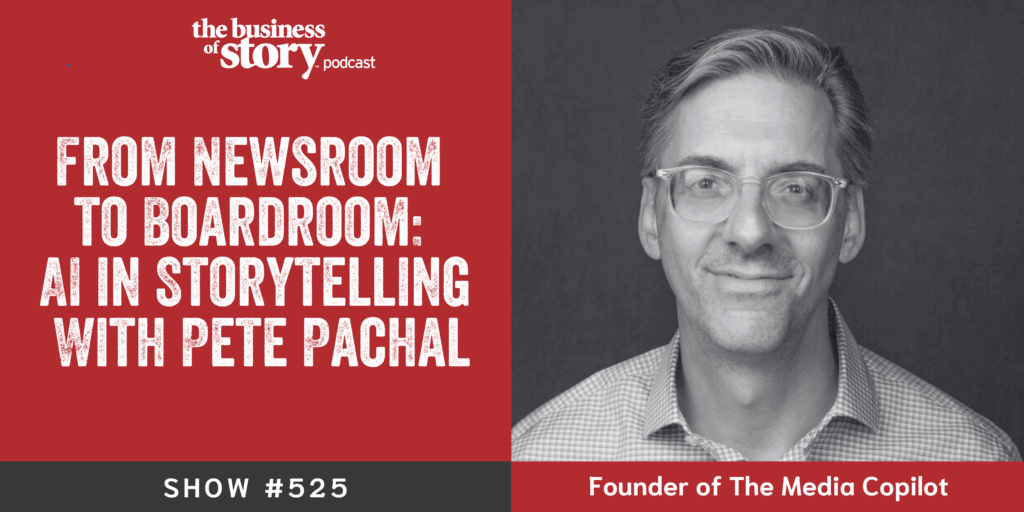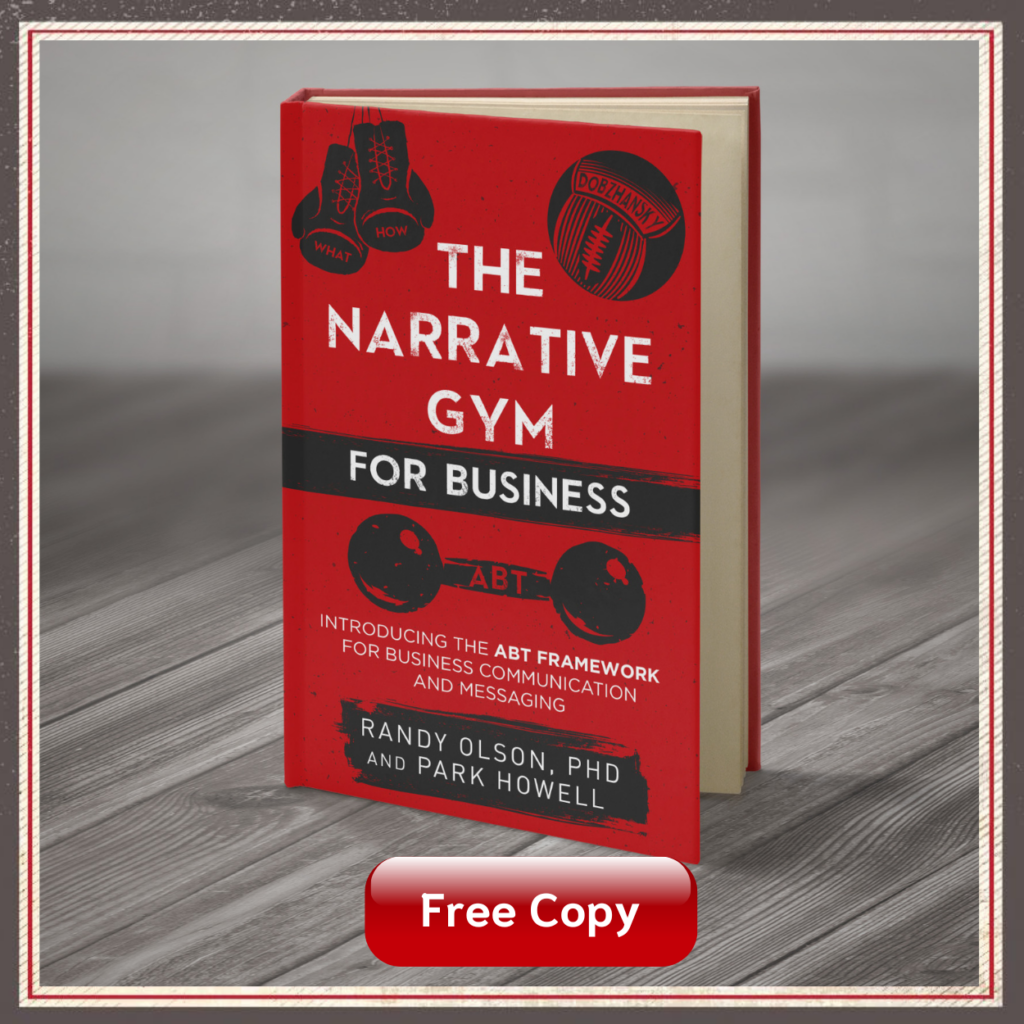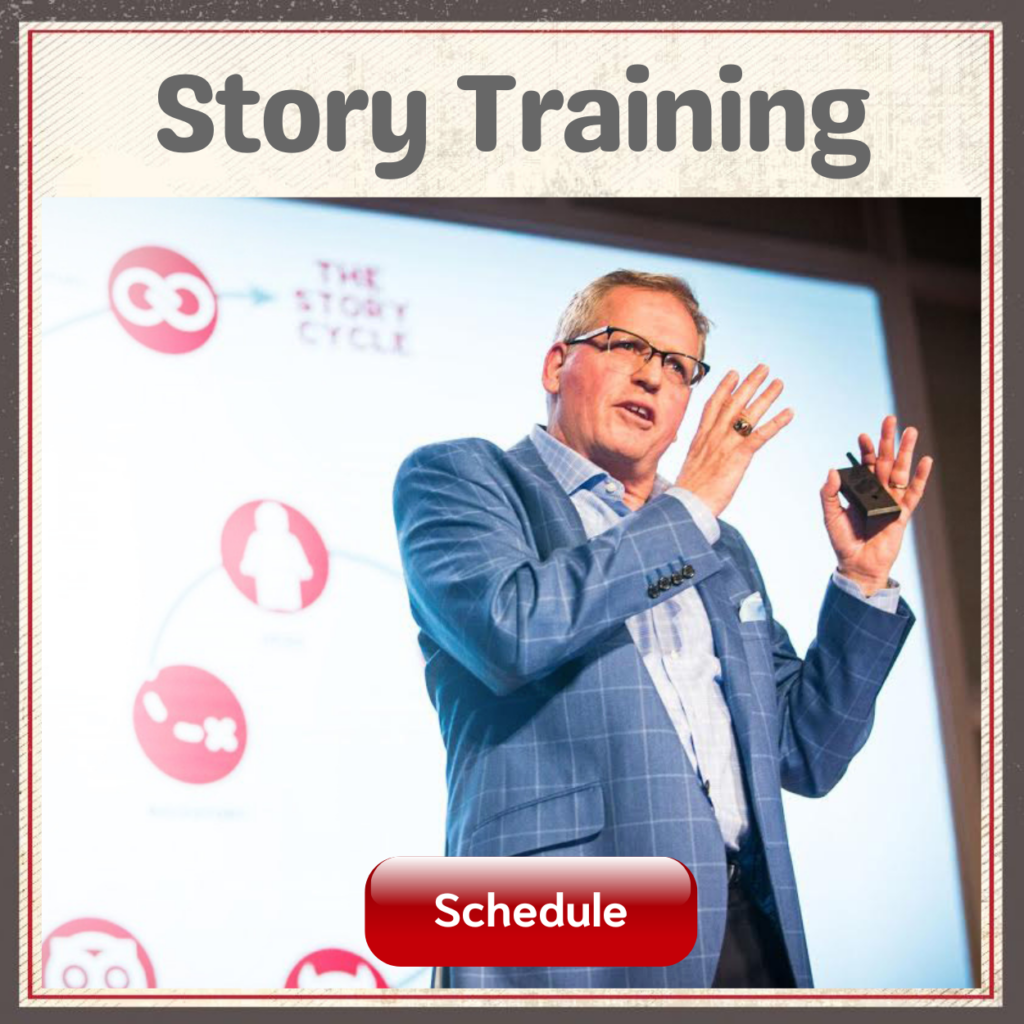From Newsroom to Boardroom: AI in Storytelling With Pete Pachal

How AI Is Transforming Media: Essential Insights for Content Creators
Discover how AI is revolutionizing journalism and content creation with Pete Pachal, founder of Media Copilot and veteran journalist with 25+ years covering technology.
Pete has consulted on AI strategies for The Washington Post and BBC, appeared on CNN and Fox Business, and teaches AI implementation to media professionals worldwide.
Key Takeaways for Content Creators:
AI Implementation Without Losing Authenticity:
Learn Pete’s “Level 1-2” approach to AI collaboration—using tools like Claude Opus for research and brainstorming while maintaining your unique voice and editorial integrity.
The Future of Content Consumption:
Understand how AI is enabling hyper-personalized content delivery through podcasts, video summaries, and custom formats that deepen audience engagement.
Practical AI Strategies You Can Use Today:
Pete shares three actionable steps: build a custom AI assistant, use AI collaboratively (not as a vending machine), and leverage voice interaction for turning thoughts into insights.
Avoiding AI Pitfalls in Professional Content:
Discover how to navigate AI hallucinations, maintain fact-checking standards, and use AI to enhance rather than replace original research and reporting.
The Evolution from Aggregation to Originality:
Learn why AI is forcing content creators back to authentic, original work—and how this shift benefits both creators and audiences seeking trustworthy information.
Why This Matters for Your Business
As someone who’s guided media transformations from print to digital to AI, Pete reveals how authentic professionals using AI strategically will outperform both AI-only content and AI-resistant creators.
You’ll discover specific tools, ethical frameworks, and implementation strategies that maintain credibility while amplifying your impact.
What’s In It For You:
- Ethics in AI usage is crucial for maintaining trust in media.
- AI can enhance efficiency but requires human oversight.
- The media industry must adapt to new business models in the AI era.
- Collaboration with AI can lead to better content creation.
- Understanding AI’s limitations is essential for effective use.
- Media professionals should embrace AI as a tool for innovation.
Chapters:
- 00:00 Introduction to AI in Media
- 02:31 The Role of AI in Journalism
- 12:43 Navigating AI’s Impact on Media
- 18:05 Ethics and AI in Journalism
- 25:19 The Rapid Evolution of AI Technology
- 26:33 The Impact of AI on Business Efficiency
- 27:47 AI’s Role in Journalism: Challenges and Opportunities
- 30:15 Business Models in Media: Adapting to AI Disruption
- 31:56 The Future of Media: Custom AI Solutions
- 36:09 Hyper-Personalization in Content Delivery
- 39:25 Getting Started with AI: Practical Recommendations
- 43:52 AI in Brand Assessment and Strategy
Links:
Popular Related Episodes You’ll Love:
- How AI is a Storytelling Collaborator, not a Competitor, with Hamlet Azarian
- Your Story is Your Strategy with Renee Frojo
- How to Build an Unforgettable Brand Using Neuroscience with Rande Vick
Your Storytelling Resources:
Connect with me:
- Instagram: https://www.instagram.com/parkhowell/
- Facebook: https://www.facebook.com/groups/BusinessOfStory
- YouTube: https://www.youtube.com/channel/UC0ssjBuBiQjG9PHRgq4Fu6A
- Twitter: https://twitter.com/ParkHowell
- LinkedIn: https://www.linkedin.com/in/parkhowell/
- Website: https://businessofstory.com/abt/
Transcript of Show:
Park Howell:
Hello, Pete. Welcome to the show.
Pete Pachal:
Hey, pleasure to be here. Thanks for having me. I bet you get that a lot.
Park:
That’s close enough. I get Bark, I mean, I get everything. One time at a Starbucks, I ordered my coffee and they put “Bark” on the side. And I thought to myself, did that barista really think someone was named Bark? But apparently they did. No big deal. But it’s great having you here. We’re going to explore media.
AI—we’ve talked a lot about AI here on the Business of Story around brand development, content creation, that kind of thing—but we’ve never really explored it in the media world: the implications of ethics, research, what you can believe, what you should toss out, and where this world is going. I’m so happy to have you here. Could you give us a little background on what makes you an expert in the media field and AI?
Pete:
That’s a very good question and I’m glad you’re checking your sources right off the bat. I’ve been a journalist for over 25 years, covering mostly technology, which includes AI. I’ve worked for companies like Mashable, CoinDesk, and NBCUniversal. When I left CoinDesk, AI was just becoming mainstream. One of the last things I did there was figure out their AI strategy.
I knew I wanted to apply AI to media, so I founded Media Copilot. I started by learning everything I could about how AI is changing the media profession and sharing it through my newsletter. That led to being asked to speak to teams about AI. Those sessions went really well, so I launched formal classes, which are now a major part of what I do—teaching journalists, PR professionals, and communications teams how to use AI while maintaining integrity.
The newsletter still goes out twice a week. I also host a podcast where I talk to media leaders and AI builders. The mission is to understand how AI is changing how people consume information and what that means for the future of media.
Park:
So people aren’t necessarily vetting information as stringently because they’re just believing what AI gives them?
Pete:
That’s a real problem. AI can hallucinate. The models are getting better, but hallucinations are still baked into the technology. You can take steps to mitigate them on both the production and consumption sides, but people seem to just tolerate them. They know AI makes mistakes, but they keep using it—usage is skyrocketing. I think it’s because most people aren’t using AI for life-or-death advice. If it gives you so-so advice on multivitamins, most figure they’ll survive.
Park:
We were watching The Liver King doc last night—have you seen it? This guy built a multi-million dollar empire selling ancestral supplements and raw organ meats, and it turns out he was on steroids the whole time. He manipulated the media environment to build a false image. I think the same caution applies to AI. It’s not intentionally misleading us, it’s just limited to what it finds online.
Pete:
Exactly. AI doesn’t have intent. It just reflects what it’s trained on and what users prompt it to do. There’s no spark or soul behind it—it’s a tool. And as a human using it, you’re responsible. You can take credit when it goes well, but you also have to take the blame when it doesn’t. There’s no entity to put on trial.
Park:
Let’s talk about the evolution of journalism. In the past, journalists hit the beat, called people, verified facts. Then came the Internet, speeding up research. Now we’ve got ChatGPT. How are you coaching media professionals to use it while avoiding its weaknesses?
Pete:
First, I love your description—it’s how journalism should work. But in the 2010s, journalism got sidetracked by aggregation: just rewriting what others had already published to chase clicks. That was unhealthy.
Now, AI is forcing a correction. It prioritizes original information and credible sources. AI doesn’t reward aggregation like search engines and social media did. So I coach journalists to stop chasing clicks and get back to real reporting—call people, do original research, break new ground.
Yes, use AI to speed up repetitive tasks and assist with research. But the core of journalism—accuracy, originality, trustworthiness—must stay human. Be unique. Offer fresh insights. That’s how you’ll stand out and how AI will eventually reward you.
Park:
And that’s true for any profession, especially in branding and marketing. You’ve got to show up as your authentic self, then use AI as a creative partner—not let it take your voice away.
Pete:
Exactly. And tools like LinkedIn or Google may say they’ll penalize AI-generated content, but how would they know? Not all AI content is slop. Some is actually good, especially when refined by humans. But yes, the vast majority of low-quality content is AI-generated. So it’s a marker, but not the whole story.
Park:
And you’re not guilty for using AI to help with LinkedIn posts.
Pete:
Right. I’ll use it to get ideas flowing, but I always revise. It’s not binary—AI usage is a spectrum. Think of it like self-driving cars. Level 0 is fully human. Level 4 is fully AI. Most of my writing is Level 1 or 2—AI helps with research or brainstorming, but I’m still doing the heavy lifting. And that’s the sweet spot: collaborative, human-guided AI.
Park:
What’s one of the top questions you get from journalists?
Pete:
They want to know if using AI is cheating. Or what happens to their jobs. In PR, the ethical boundaries are different than in journalism, but the question still comes up.
The best response I can give: AI won’t replace you, but someone who knows how to use it effectively might. You can’t afford to ignore it. Early on, many media companies cherry-picked AI’s mistakes to dismiss it—but the tech is improving rapidly. Better to understand and shape its use than let it wash over you.
Park:
So what’s your go-to model for human-sounding writing?
Pete:
For a long time, Claude Sonnet. Now I’m leaning into Claude Opus, also from Anthropic. It’s a great writing partner. I don’t do much coding, but Opus can even help create dashboards from spreadsheets—no coding knowledge required.
Park:
When did you start teaching AI to journalists?
Pete:
Formally, January 2024. Informally, a bit before that. I’d already led internal workshops on SEO and content management systems at places like Mashable. So teaching came naturally, and AI just gave it a new focus.
Park:
Have you ever seen anything grow as fast as AI?
Pete:
No. Smartphones and social media were big, but they didn’t move this fast. Facebook didn’t even go public for the first couple of years. AI’s pace is absolutely unprecedented.
Park:
In business, AI improves efficiency and speed. But is that same speed good for journalism—or does it just open the floodgates to misinformation?
Pete:
The pace itself is painful. Journalists are still figuring it out. AI-generated content had a rough start. There have even been issues with AI misrepresenting news—like Apple’s AI notifications confusing facts in BBC reports.
But the biggest issue is compensation. AI uses publishers’ content without always driving traffic back to them. That breaks the business model. Licensing deals are starting to appear, and some publishers are shifting to subscriptions, events, and other models—but the path forward is still uncertain.
Park:
So what’s stopping media companies from building their own GPTs and just mass-producing content?
Pete:
Nothing, really. But the key is how they use them. Some companies are already doing that. The risk is chasing short-term ad revenue rather than building long-term value. Sustainable growth, consistent engagement, and unique content should be the goal. AI can help, but only if used with purpose.
Park:
And AI opens the door to hyper-personalized content, right?
Pete:
Absolutely. It can deliver news in formats users prefer—podcasts, video summaries, even TikToks. AI lets media brands personalize delivery and deepen engagement. You could even use cloned voices of reporters to narrate articles. The opportunities are enormous.
Park:
So for listeners just getting started with AI, what are three things you recommend?
Pete:
- Build an Assistant – Use a tool like GPT or Claude to create an assistant that understands your voice, goals, and needs.
- Use It Collaboratively – Don’t treat AI like a vending machine. Work with it. Bounce ideas off it.
- Use It Verbally – Talk to your AI. It’s surprisingly effective at turning rambling thoughts into useful insights.
Once you do that, you’ll start building habits around using AI as your interpretive collaborator.
Park:
I ran your brand through the StoryCycle Genie™. Just your URL and LinkedIn. It created a brand assessment and narrative strategy in under two minutes. What was your reaction to the results?
Pete:
I thought it was great. It captured the many dimensions of what I do—teaching, writing, my background in journalism. It stayed at that “helicopter level” and gave a comprehensive picture. I serve both media and PR, and the Genie picked up on that nuance.
Park:
It generated this position statement:
“Media Copilot is the only AI education platform led by a veteran journalist with 20+ years of newsroom experience, providing vendor-neutral, industry-specific training that helps media professionals implement AI tools effectively while maintaining editorial integrity.”
Accurate?
Pete:
Yeah, nailed it. Especially the vendor-neutral part. That’s something I care deeply about. I don’t take money from AI vendors to promote their tools. I recommend what works, period.
Park:
It also generated this unique value proposition:
“Transforms media professionals into confident AI implementers.”
Pete:
I love that. I hadn’t phrased it that way, but it fits. I teach tools and frameworks that help people go beyond basic prompting. That’s what implementation really means—custom tools, smart use, real results.
Park:
That’s exactly how we built the StoryCycle Genie™—to be your creative collaborator. Pete, where can people find you?
Pete:
Visit mediacopilot.ai. You’ll find everything: classes, newsletter, podcast. Or email me at pete@mediacopilot.ai. Even if you hate AI, I’d love to hear from you.
Park:
Pete, thank you for your time and your insights.
Pete:
Thank you, Park. It’s been a pleasure.
 Listen To More Episodes
Listen To More Episodes











